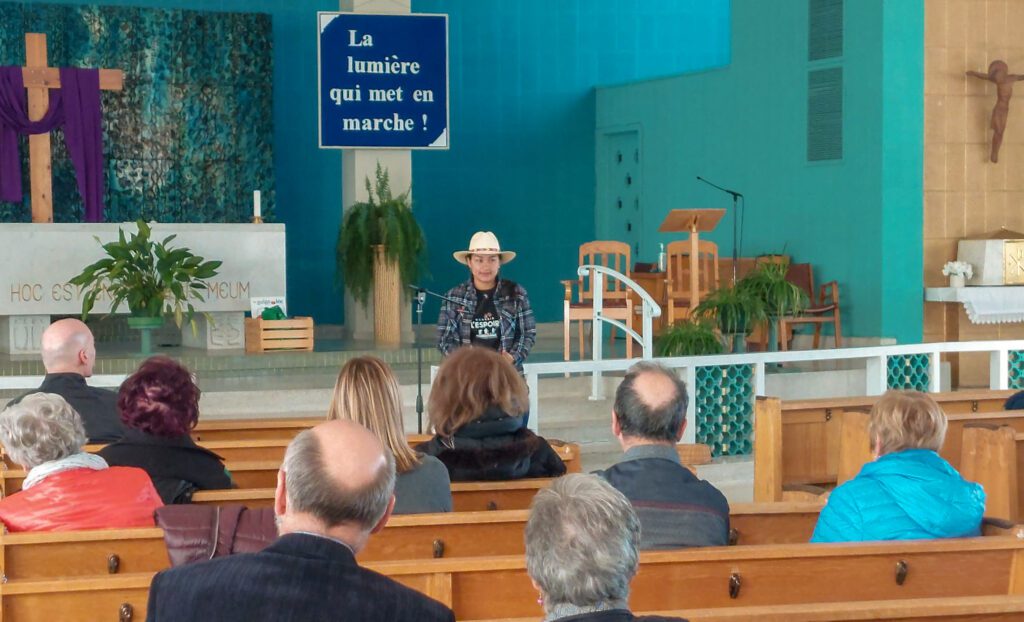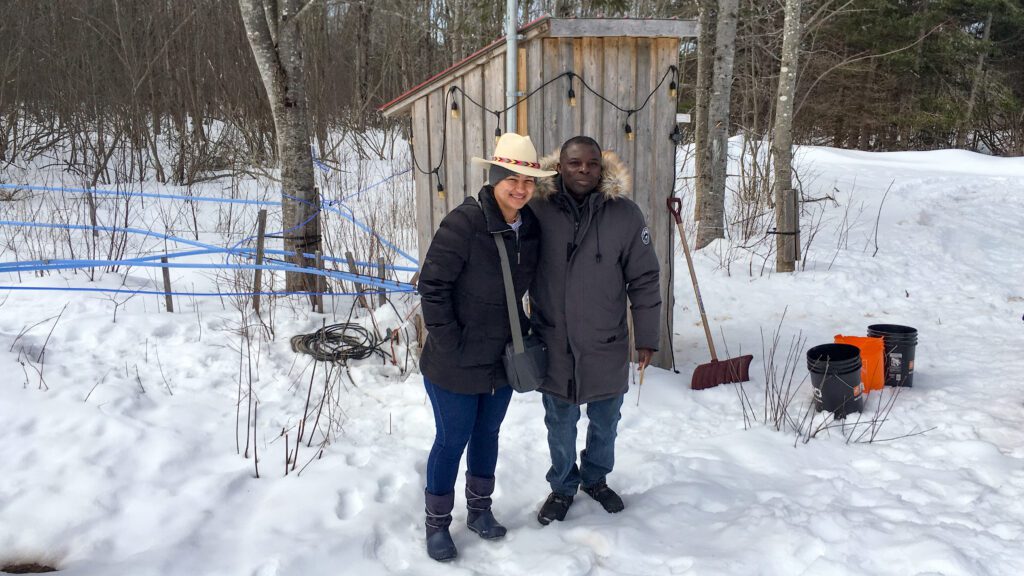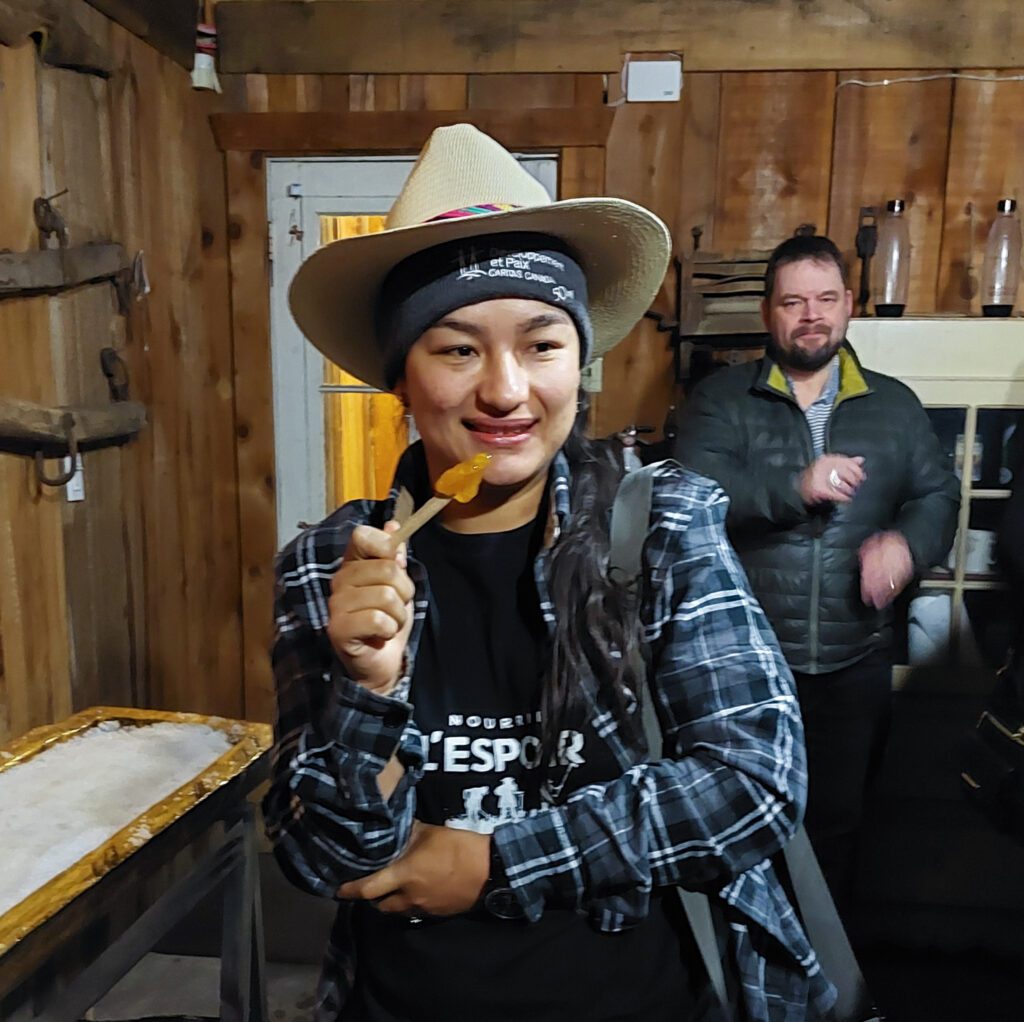By Philippe Lafortune, animator for Central and Southern Quebec


The sun rises, the birds take off. Day breaks gently, but the awakening is rude. For it is not mommy who lovingly stirs you this morning, but a gunman who barks, “You have 30 minutes!” You must leave home, taking nothing but the vivid memories of your homeland and the fond hope of returning one day.
To find oneself again
María Raquel Soto Ramírez was still a child when war displaced her―twice―before taking her father. He became one of the 220,000 victims of Colombia’s deadly 50-year-long conflict. The 1996 peace accords and the election of a progressive government in 2022 have sparked hope for normalcy, but the path to enduring change remain perilous. Soto’s story is also the story of Colombia.
At the behest of private corporations, with the authorities’ complicity, entire communities are still denied fundamental rights and dispossessed of their ancestral lands. Their leaders are threatened, falsely imprisoned and even murdered with impunity simply for defending the waters and lands their peoples live off.
I come from a country that rebuilds itself every day, trying to overcome a long war that has affected everyone; stripped us of our land; claimed our loved ones; and taken our leaders who denounced injustice. But this has also motivated encounter and participation in the communities that suffer the conflict’s consequences.
Raquel Soto, activist filmmaker
A proud peasant woman from northern Colombia, Soto is a facilitator at the documentary filmmaking school run by the Asociación Campesina de Antioquia (ACA), a Development and Peace ― Caritas Canada partner since 2003. She teaches audiovisual techniques to young people so they can tell their stories through documentary filmmaking instead of taking up arms.
Faced with the uncertain politics of war, ACA offers a reassuring poetics of the earth. With the tenth of global biodiversity that Colombia hosts being threatened, Soto thinks “the earth is a good teacher of patience, perseverance and gratitude for all the abundance” that she fears will be lost if it is not protected and shared. But we must learn to heed the earth and know it better. Like Soto does.
As the face of our Stand for the Land Share Lent campaign, Soto had joined its virtual launch event from Colombia. Then, when she became our first solidarity in nearly five years, it was finally time to meet her in person.
Stand for the Land
Soto arrived in Quebec with spring. Within 24 hours of landing, she was addressing 300 people at a concert in aid of Development and Peace ― Caritas Canada in La Nativité Church in La Prairie, Que.
After the music, presentations and video show, a question was posed as to how to continue in the face of so much adversity. “Prayer and faith allowed us to face our grief, console our spirits and continue on the path to returning to our territories to sow hope anew,” Soto replied.
Thus was set the theme, tone and scope of her solidarity visit which took her from Montreal to Moncton over two weeks. Soto’s touching testimonies during her interactions with our national council and the Foreign Missions Society of Quebec all hammered home the same message.
Learning to believe in oneself, to build together, to contribute according to one’s capacities…. For instance, Soto said, “In a project coordinated and energized by purpose-trained local women, we are building educational and artistic spaces in communities in five municipalities.”
During a national webinar, Soto shared her experiences with members and supporters from coast to coast who had not been able to attend her presentations.
Between all her public and private engagements, Soto took in, camera in hand, Quebec’s natural and cultural landscape including Mount Royal; the Old Port; the Notre Dame and Mary Queen of the World basilicas; a genuine sugar shack; and even a screening of the documentary, Life is a Circus, at the International Festival of Films on Art.




Cameras for communities’ causes
Creativity is a powerful tool and a privileged vehicle for exploring the richness and diversity of the natural environment and the human spirit, especially essential, existential, sensitive and even subversive issues such as the desire to live simply, safely and together on one’s native land, the land of one’s ancestors.
Soto showcased this aspect of creativity at the International Rendezvous seminar series at the Université de Montréal. At an event entitled Documentary Creation as a Tool for the Defence of Life and Territory in Colombia, she exhibited her intimate documentary, To Return to Myself.
In the same vein, Soto also discovered a borderless community of practice in the Wapikoni collective. This mobile audiovisual training and production studio has offered immersive, interactive workshops to over 5,000 youths in a hundred Indigenous communities. Their dreams, realities and creativity have found expression in some 2,000 productions since 2004. They show that the issues faced by our Indigenous sisters and brothers here and in the Global South are at once unique and universal.
“I come from a collective process,” Soto said, adding that she felt like she had found herself and begun to live again since joining ACA’s documentary filmmaking school. After a childhood tainted by violence, “It was the only opportunity to do something different, to be able to dream.” She especially appreciated doing creative work with young people on their own territory because educational opportunities were otherwise scarce in the countryside.
The idea is to use audiovisual techniques as tools for learning and sharing; acquiring social, technical and artistic skills; developing confidence and self and others; and cultivating a sense of belonging to something bigger than oneself: the community. Wealth, values and culture are discovered in the process.
Soto said, “Art has allowed us to comprehend and apprehend our history; to build memory; to value and admire the strength of our mother and our communities; to measure the beauty of the territories we inhabit; to express our concerns, reflections and ideas; and to transform our lives and environments.”
Soto is part of El Retorno Productions (see YouTube channel in Spanish) and the Río Verde peasant network of biodiversity-focused documentary filmmakers. Their films document the richness of rural communities and the threats they face, including forced displacement, deforestation and the misappropriation of natural resources.
Reposing faith in the adage that a picture is worth a thousand words, Soto and ACA are devaluing violence. In a country ravaged by war, it takes courage to choose cameras over guns; to film nature and culture so that they may be protected by being shared; to tell one’s story; to show one’s daily life; and to forge one’s future.
A world without borders
Soto concluded the Montreal leg of her tour with a special panel discussion at the iconic Centre for Sustainable Development on World Water Day (March 22). The event was anchored by Félix Molina, journalist, researcher and director of the Committee for Human Rights in Latin America. The panel included Elvin Hernández, an investigator with ERIC-Radio Progreso (see website in Spanish), one of our Honduran partners.
Hernández spoke of how dangerous and essential defending justice is in his tiny Central American country, which is among the most violent in the world. He described the struggle of the people of the Guapinol river basin against mining projects.
While ACA uses film for education, development and the defence of rights, ERIC-Radio Progreso uses community radio (see YouTube channel in Spanish) document, denounce and publicize violations of human and environmental rights.
It is hoped that Hernández, who joined three of Soto’s events remotely from Honduras, will be our solidarity visitor during our fall campaign. Like Soto, he will meet our members and the Canadian public to discuss issues of justice.
Our long-time partners, ACA in Colombia and ERIC-Radio Progreso in Honduras are also supported by Quebec’s ministère des Relations internationales et de la Francophonie through its New Quebec Without Borders (NQSF) program. It is thanks to this support that Soto was able to undertake this solidarity visit as part of the global citizenship education component of the Voices Without Borders in Defence of Lives and Lands project.
While the project will reach over 1,800 people directly and some 500,000 people indirectly in Latin America, solidarity visits like Soto’s are creating cross-border opportunities for exchange, learning, networking, justice and change. Soto’s Quebec sojourn, like ACA’s work in Colombia, is an example of solidarity at work; of communities becoming organized; of citizens’ groups mobilizing across Colombia with support from Canada being channelled by our programs officer Anne Catherine Kennedy; and, above all, of a movement of members who are committed to their communities year-round.
At one of her events, Soto said gratefully, “What we are doing is possible thanks to you.” Moved, an audience member, Mr. Lebel, responded, “It is good for us to meet the one for whom we are mobilizing here.”
Soto has left, but her message remains. It serves to confirm our mission, to restore confidence and courage and to Create Hope.
Like the rivers and Birds of our Land (document in Spanish),
hope, solidarity and imagination
know no borders!

